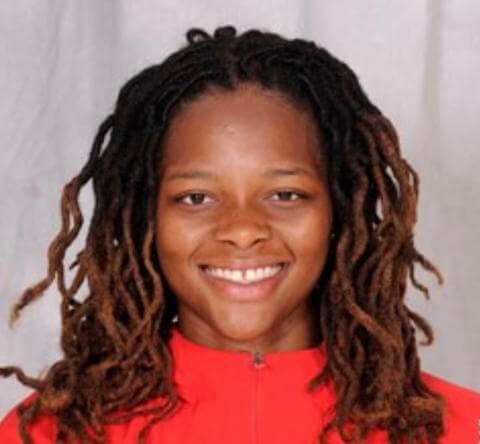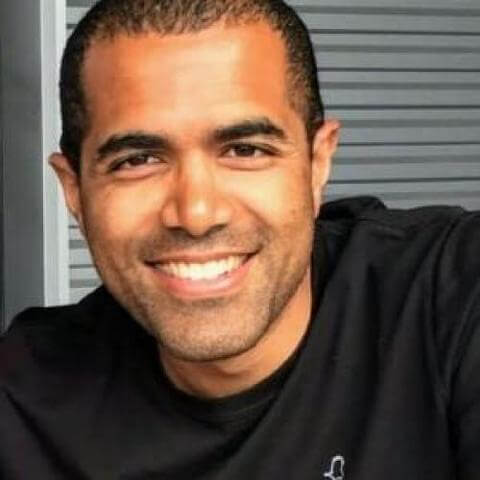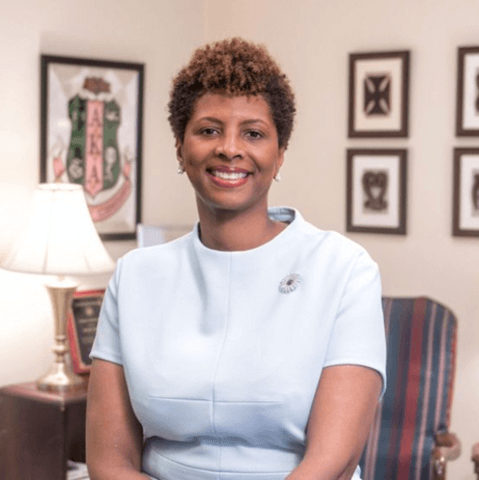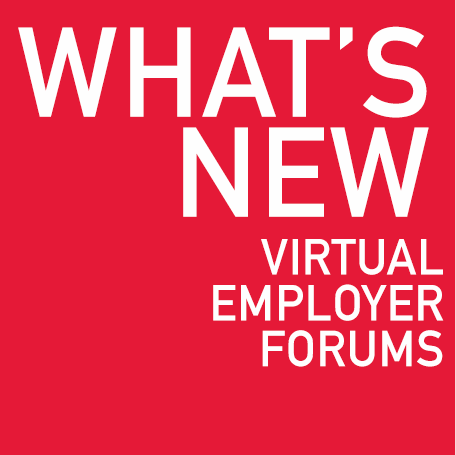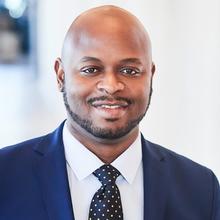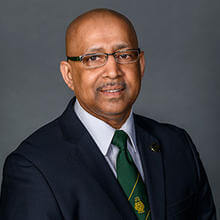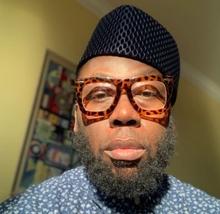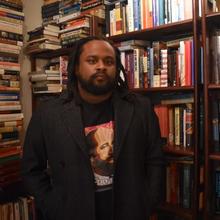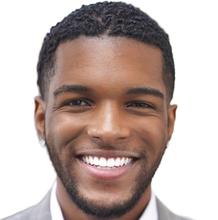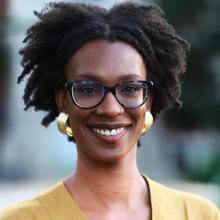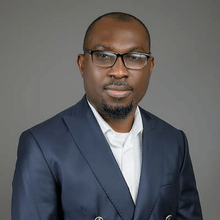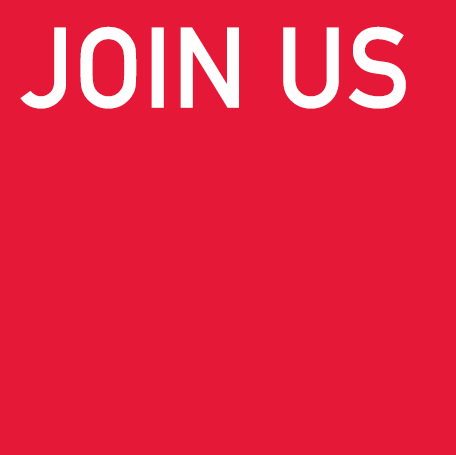The Sway: January 2023
Welcome
The Sway is Howard University Graduate School's news publication. It serves to celebrate and highlight graduate student, alumni, faculty and staff achievements and updates. It is published regularly during the academic year.
- To subscribe follow this link.
- To submit news/updates follow this link.
We also encourage all alumni to join one of our networks on LinkedIn. The Doctoral Alumni Network can be found here, and the Master's Network here. The Graduate School also regularly publishes updates on its social media channels: Instagram, Twitter and Facebook.
Bison Trailblazers: Zion Clarke
by Jasmine M. Ellis
For doctoral student Zion Clarke, a fellowship at the NOAA’s Cooperative Science Center for Atmospheric Science and Meteorology (NCAS-M) was a transformative experience. At Howard, she studies Atmospheric Science with a focus on thermal packaging.
Over the years, Clarke has repeatedly sought out research opportunities like NCAS-M as she sets her sights on a STEM career. In 2019, she was a National Science Foundation graduate researcher at the Engineering Research Center for Power Optimization of Electro-Thermal Systems (POETS). As an undergraduate at Howard, she was a research assistant at the Applied Fluids-Thermal Engineering Research Laboratory (@FTERLab) and the AEROLab at Howard.
As a young adult, she participated in Morgan State University’s NASA Science Engineering Mathematics and Aerospace Academy. It was here that Clarke was exposed to “hands-on, minds-on” STEM and inspired her to study mechanical engineering at Howard.
“My interest in science really started with the idea that the world is interconnected – all that happens in our lives can be explained or imagined through the scientific lens,” says Clarke.
Fortunately, that’s exactly the lens through which NCAS-M views research. For Clarke, the fellowship was a great fit. While in its Fifth Cohort as a master’s student, she had the opportunity to meet and be mentored by legends like Howard alum and Director of NOAA’s National Severe Storms Laboratory (NSSL) Dr. DaNa Carlis. She was also able to see how her scholarly work translated to what was happening at NOAA, particularly when working with data.
“As a student intrigued by deep learning, I saw the NCAS-M fellowship as an opportunity to work with highly esteemed scientists and meteorologists,” says Clarke. “I knew the exposure to NOAA would develop my research skills, particularly when it came to making impactful and informed decisions based on both predictive and historical data. I was especially intrigued by the role of experiential bias and its connection to atmospheric research and data.”
NCAS-M, a center with nine partner institutions, is funded by the NOAA Educational Partnership Program (EPP) and led by Dr. Sen Chiao. The Center provides fellowships to students interested in pursuing careers in the NOAA mission workforce. The fellowship provides funding to cover the cost of tuition, and students receive a yearly stipend along with additional resources to cover the cost of research and travel to professional conferences.
“The Center takes pride in providing each fellow with an opportunity to conduct research with scholars at their academic home institution and at NOAA to enhance their research skills and expand their professional portfolio. This funding source has allowed Howard University to be the leader in producing African American PhDs in the discipline of Atmospheric Science, and we have produced scholars in other disciplines, including social science, who are currently serving in the NOAA mission workforce,” says Dr. Terri Adams-Fuller, Deputy Director.
In addition, the fellows can connect with mentors and obtain professional development. There is a sense of collaboration and the expectation of an annual research plan. Clarke was even invited to the American Meteorological Society’s Annual Meeting after a summer internship at the Global Systems Laboratory (GSL) Impact-based Decision Support Services (IDSS) Engine. This opportunity and exposure to other professional organizations gave Clarke a chance to hone her networking skills.
Clarke was also able to roll up her sleeves and grapple with some of the challenges faced by researchers at NOAA. “During my fellowship, we focused on recreating and debugging agency code to produce historically derived truth data. I found it difficult to ensure code dictionaries and lists that correlated properly with live station data,” says Clarke. “With the assistance of my mentors, we were able to successfully determine where forecast impact-based decisions are most effective.”
For Clarke, who plans to start a business at some point, the NCAS-M fellowship really provided important transferable skills toward that goal. Networking, communication, interdisciplinary research, project management, collaboration, and soft skills will serve her well as she builds her research and business portfolio.
Word to the Wise: Dr. Philip Kurian
By Jasmine M. Ellis
The year just started, and Dr. Philip Kurian, principal investigator and founding director of the Quantum Biology Laboratory (QBL) at Howard University, already has much to celebrate. QBL won a $1 Million grant from the Alfred P. Sloan Foundation for its “Matter-to-Life” program.
“The Sloan Foundation funds cutting-edge research in specific areas,” says Kurian. “A relatively new program at Sloan, ‘Matter-to-Life,’ seeks to understand how life can emerge from information-processing activity among biomolecular building blocks, and how we can distinguish transitions from nonliving matter to living systems from fundamental physical principles.”
Kurian spoke to The Sway about the opportunities this funding will provide for Howard, as well as his perspectives on effective grant writing. This article has been condensed and edited for clarity.
__________________
The Sway: How does this grant align with Howard University’s mission?
Dr. Philip Kurian: “Howard University’s motto, ‘Truth and Service,’ comprises two of our core values, and the QBL’s Sloan Foundation grant will assist us in pushing the boundaries of knowledge to elevate and enrich our appreciation of the Truth. In October 2022, I gave a TED talk on how we should approach the limitlessness of Truth, showcasing how the QBL translates our scientific models of reality into opportunities to serve the next generation, and better the human experience.”
TS: What opportunities and training will this funding provide for students?
PK: Light from external sources and light produced from internal metabolism both affect living systems in complex ways. The mystery of how life transforms via interaction with light is one of the most significant and vexing problems for current practitioners, and it puzzled even the earliest proponents of quantum theory. Quantum biology—the application of quantum theory to understanding life’s complex milieu—forces us to reexamine our origins, all the way at the cosmic beginning, and to chart how purpose and agency can arise from matter governed by physical laws.
Trainees and students on the project will have the opportunity to learn techniques in quantum optics, open quantum systems, computational biology, protein photophysics, and basal cognition in a “simple” multinucleate slime mold, which has applications for diverse fields, including quantum computing, light-harvesting for energy storage, and neuroscience.
TS: How will the university benefit from this grant?
PK: Besides the scientific, technological, and commercial applications of our work, the QBL has established itself as an internationally recognized center for excellence in transdisciplinary science, which draws new pools of students, trainees, and professionals from across the globe, as well as new funding opportunities for Howard University from federal agencies and private donors. This award from the Sloan Foundation solidifies the fruit of our labors and renews the commitment the Graduate School and University have made toward investing in groundbreaking research spaces such as the one nurtured by the QBL.
TS: What advice do you have for students who might want to secure funding for their work?
PK: Develop a thick skin and reframe rejection as an opportunity to learn from feedback—a “not now” rather than a “no go.” I have received hundreds of rejections over the years, but one must learn to dust off the disappointments with loved ones and trusted advisors… and then move on, integrating the counsel received, and improving your efforts by faithfully addressing even the most negative critiques.
In the early stages of your education and career, apply often for unique opportunities. You never know how those applications—even if initially rejected—could form the seeds for your future.
Of course, read the instructions and eligibility guidelines for each grant carefully, but don’t take yourself out of the game just because you don’t see people like you represented. You can’t win the grant you don’t submit!
TS: Is there anything else that you would like to share?
PK: The QBL is a scientific research group first, but we have also curated a transformative lecture series, “Decolonizing the History and Future of Knowledge,” in which alternative narratives of scientific history and technological futures across disciplines are welcomed and encouraged. We are a group of thinkers dedicated to understanding the myriad mystery of how distinct first-person subjectives can co-experience a third-person physical reality. Consciousness to us is not just a physical phenomenon; it is an aspirational goal toward which we strive, in all that we do.
Dean's Corner
While the Spring semester completes the academic year, it is the start of the calendar year. And the start of the new year gives us all the opportunity to refocus our energy, to do more of what we think matters. This is certainly true for the work we do in the Graduate School at Howard.
I’m excited to announce that three initiatives have been funded recently to help us do more of what we think matters. The first is a National Endowment for the Humanities grant to launch a digital humanities certificate program for humanities and social sciences projects. So many of our students can benefit from this program, as the projects they will take on will certainly teach us more about history and culture and the ways these impact the world. The second is a generous gift from Meta (formerly Facebook) to think about privacy issues that adversely impact Black and Brown communities. We have accepted the task of convening the best minds from our sister HBCUs to think about how we can benefit from technology without relinquishing our rights. The third project is supported by the Mellon Foundation and in collaboration with Georgetown University Medical Center—a center for Medical Humanities that seeks to end race-based health disparities in DC. We think another health reality is possible. And we intend to make it real.
It’s easy to lose sight of the big picture in academia. We are focused on our research and to developing the next generation of teachers and researchers. These are lofty aims, indeed. But the thing that informs these aims is the creation of a better world for us all to live in. We get to build that world—one class, one cohort, one project, one imagination at a time.
Here’s to the new year and to doing the work that matters…
Dana A. Williams, Ph.D., Graduate Dean
What's New
As part of the an effort to support students, the Graduate School launched its first-ever Virtual Employer Forum series this winter.
The inaugural program offered a conversation with Senior Policy Researchers at the Rand Corporation – Dr. Dionne Barnes-Proby, Dr. Malcolm V. Williams and Dr. Obaid Younossi. The speakers provided insights into Rand’s multidisciplinary and team-oriented work culture as well as the company’s interest in
recruiting individuals with lived experiences, and transferable skills. Williams spoke at-length about projects that had a direct impact on others.
The forum also tried to underscore the need for graduate students to acquire other skills during the doctoral process. This was echoed by the presenters during the Q and A session. “It is really important to have strong interpersonal, writing, and communication skills,” said Barnes-Proby. Younossi also talked about the importance of networking as a path to building research capacity across disciplines.
Graduate students were able to learn more about the hiring process and some of the strategies to ensure a strong application. In addition, they learned that Rand offers 12-week summer paid internships (virtual and in-person).
Yes!
Dr. DaNa Carlis (’07 PhD, Atmospheric Science) has been named the director of NOAA’s National Severe Storms Laboratory (NSSL). He joins the world’s preeminent research institution for observing and understanding severe thunderstorms and extreme weather. He is the first African-American to be named a lab director in NOAA’s Office of Oceanic and Atmospheric Research.
Dr. Roger Ramsammy, (’93 PhD, Molecular Biology) President of Hudson Valley Community College, was recently elected to the Board of Directors of the World Federation of Colleges and Polytechnics. President Ramsammy is currently the only U.S. college president on the board, and Hudson Valley Community College is one of the only U.S. members of the WFCP’s Global Member Network.
Dr. Omar Akbar (’20 PhD, African Studies) was recently published by Massachusetts Institute of Technology Press in the Afro-Futurism anthology titled Boogie Down Predictions- Hip Hop Time and Afro-Futurism.
Dr. Joshua M. Myers, Associate Professor of Africana Studies in the Department of Afro-American Studies, recently published a new book entitled Of Black Study (Pluto). In it, Dr. Myers explores how the ideas of Black intellectuals created different ways of thinking and knowing in their pursuit of conceptual and epistemological freedom.
Graduate Students
Arsene Frederic Jr., a doctoral student in the School of Education, has been selected for one of 15 highly competitive annual fellowships with the Community for Advancing Discovery Research in Education (CADRE), a resource network for STEM education researchers supported by the National Science Foundation (NSF).
Ashleigh Brown-Grier a doctoral student in Higher Education Leadership and Policy Studies, is also the founder of iHBCUx, an organization that increases institutional diversity in international exchange programs. Beyoncé’s BeyGood Foundation recently recognized iHBCUx for its commitment to getting Black students abroad.
Victor Ejigah, a Pharmaceutical Sciences doctoral student, recently secured the prestigious Pharma Foundation Predoctoral Award. His project is focused on the development of novel stealth pertuzumab and neratinib loaded nanoparticles for HER2 positive breast cancer treatment.
The Virtual Symposium: A Return to African and Diaspora Dialogues
Department of African Studies - February 15, 2023
The graduate student symposium aims to bring together graduate students at Howard University and graduate students at the University of Ghana together for a Pan-African conversation on the connections and interactions between Africans on the continent and in the African diaspora. Registration link
Virtual Employer Forum: Internships at the Edison Electric Institute
with Patrice J. Hunter and Carrie Smith
February 16, 2023 (12:00 – 1:00 P.M. EST) Registration link
Virtual Employer Forum: Boston Consulting Group
with Tiffany Smith and others
February 21, 2023 (12:00 – 1:00 P.M.) Registration link
Calling all graduate alumni
We are looking for speakers for the 2023 Doctoral Career Pathways Conference (March 27 – 31, 2023). There will be three 1-hour sessions each day on topics as follows: academia, federal govt, nonprofits, consulting, start-ups, health careers, communications/marketing, social science research, STEM research, data science, intl issues, policy/advocacy, education, postdoctoral path. Please email annadecheke.qualls@howard.edu.

